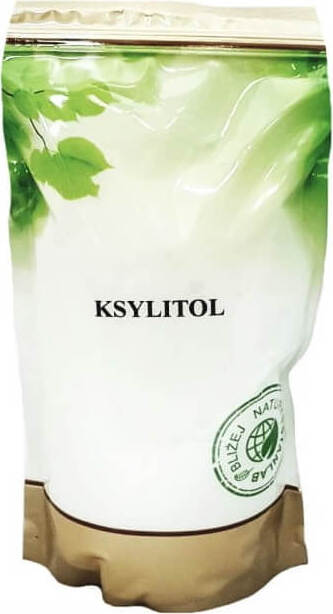Xylitol Danisco Finnish Birch 500g STANLAB
- Regular price
- €9,59
- Regular price
-
- Sale price
- €9,59
- Unit price
- per
Couldn't load pickup availability
Description
xDESCRIPTION
Xylitol Danisco Finnish Birch 500 g STANLAB
- 40% fewer calories than sugar
- 1 gram equals 2.4 kcal
- the glycemic index of xylitol is only 8
- lowers the pH in the oral cavity
- facilitates the absorption of calcium in the body p>
Xylitol is primarily birch sugar, but can also be obtained from other plant products. It is a polyhydroxy or sugar alcohol, a derivative of xylose. Its structure stimulates the receptors responsible for the sweet taste of the tongue.
It occurs naturally in raspberries, strawberries, plums and even cauliflower. Finnish xylitol is xylitol extracted from birch. The term xylitol itself can refer to other fruits and vegetables. Then it is most often made from corn. Depending on the product from which it is obtained, we have different methods to obtain it. Birch comes from the fermentation of bacteria and yeast. Corn, on the other hand, is made by the hydrolysis of biomass.
Xylitol, which looks like sugar and even has a similar sweetness, differs primarily in calorie content. Its calorific value is much lower, even up to 40%. 1 gram has only 2.4 kcal. Its glycemic index is only 8, for comparison: conventional sucrose has IG = 70 and glucose even IG = 100. For this reason, xylitol does not increase blood sugar levels as much as conventional. It is therefore suitable as a sugar substitute for people who should exclude products with a high glycemic index from their diet and do not want to do without sweetening coffee, tea or sweet snacks and cakes.
In foods, xylitol is most commonly found in chewing gum and candy. It is increasingly being used as a sugar substitute in healthy versions of candy and cakes. Perfect for sweetening coffee, tea, smoothies, desserts and ice cream. It's heat stable, so we can confidently turn recipe sugar into xylitol.
The presence of xylitol in the gums is not accidental. When consumed, xylitol does not ferment with bacteria and therefore does not produce acid that adversely affects tooth enamel. In addition, it lowers the pH of the oral cavity and increases the production of saliva, which has a positive effect on the condition of our teeth. Xylitol also facilitates the absorption of calcium, so it is beneficial to include it in the diet for those who are deficient. However, it does have the downside that consuming too much can cause depletion, so you should monitor the amount consumed throughout the day.
INTEREST
Our body is able to produce xylitol itself, which is formed during metabolism during digestion.
By substituting xylitol for sugar in recipes, we add it in the same amount as regular sugar because it's sweet similar.
W foods appear under the symbol E967.
INGREDIENTS
100% Finnish xylitol.
- including sugar
- including polyols
0.2g
98.5g
0%
38%
* RWS - Nutritional Reference Value.
APPLICATION
As a table sweetener, 1 teaspoon of xylitol is equivalent to about 1 teaspoon of white sugar.
ALLERGY INFORMATION
Product may contain: mustard, celery, grains containing gluten, sesame, peanuts, other nuts, sulfur dioxide.
STORAGE
Store in a tightly closed container in a cool, dry place. p>
similar products
- Regular price
- €9,59
- Regular price
-
- Sale price
- €9,59
- Unit price
- per
- Regular price
- €9,59
- Regular price
-
- Sale price
- €9,59
- Unit price
- per
- Regular price
- €9,59
- Regular price
-
- Sale price
- €9,59
- Unit price
- per
- Regular price
- €9,59
- Regular price
-
- Sale price
- €9,59
- Unit price
- per
- Regular price
- €9,59
- Regular price
-
- Sale price
- €9,59
- Unit price
- per
- Regular price
- €9,59
- Regular price
-
- Sale price
- €9,59
- Unit price
- per
- Regular price
- €9,59
- Regular price
-
- Sale price
- €9,59
- Unit price
- per
- Regular price
- €9,59
- Regular price
-
- Sale price
- €9,59
- Unit price
- per
- Regular price
- €9,59
- Regular price
-
- Sale price
- €9,59
- Unit price
- per
- Regular price
- €9,59
- Regular price
-
- Sale price
- €9,59
- Unit price
- per
Recently Viewed Products
- Regular price
- €9,59
- Regular price
-
- Sale price
- €9,59
- Unit price
- per
- Regular price
- €9,59
- Regular price
-
- Sale price
- €9,59
- Unit price
- per
- Regular price
- €9,59
- Regular price
-
- Sale price
- €9,59
- Unit price
- per
- Regular price
- €9,59
- Regular price
-
- Sale price
- €9,59
- Unit price
- per
- Regular price
- €9,59
- Regular price
-
- Sale price
- €9,59
- Unit price
- per
- Regular price
- €9,59
- Regular price
-
- Sale price
- €9,59
- Unit price
- per
- Regular price
- €9,59
- Regular price
-
- Sale price
- €9,59
- Unit price
- per
- Regular price
- €9,59
- Regular price
-
- Sale price
- €9,59
- Unit price
- per
- Regular price
- €9,59
- Regular price
-
- Sale price
- €9,59
- Unit price
- per
- Regular price
- €9,59
- Regular price
-
- Sale price
- €9,59
- Unit price
- per
- Choosing a selection results in a full page refresh.











